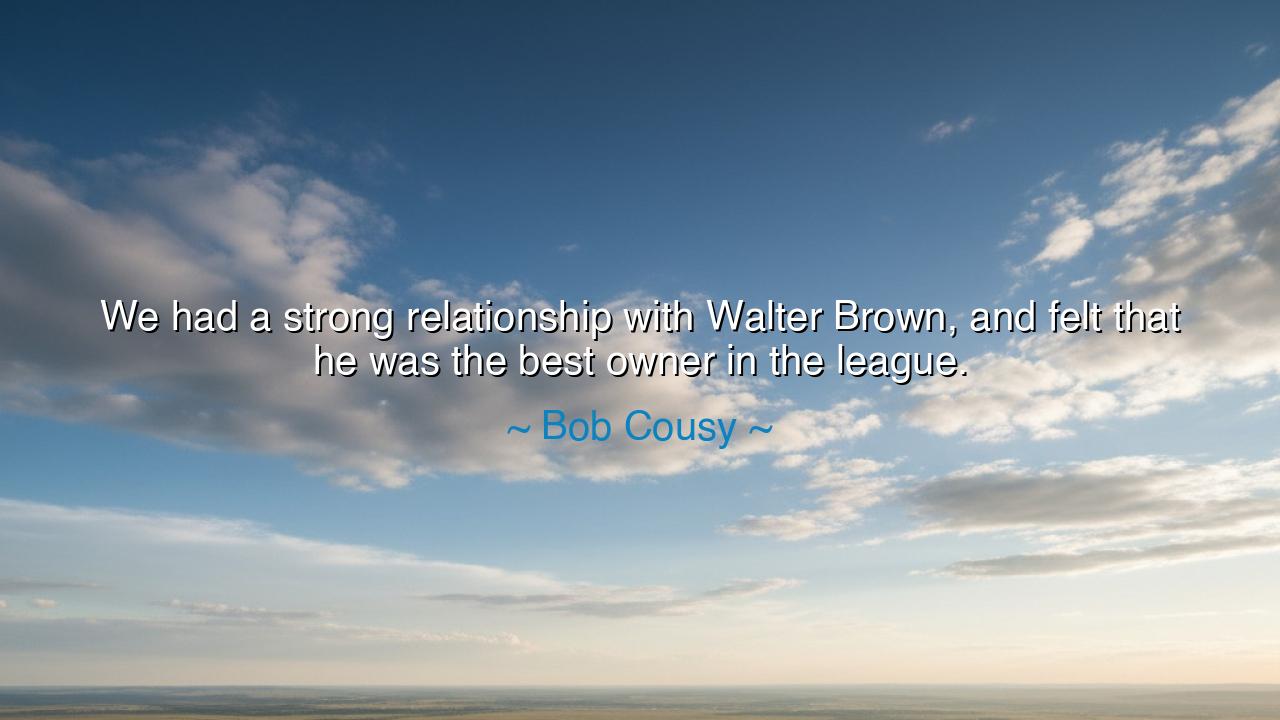
We had a strong relationship with Walter Brown, and felt that he
We had a strong relationship with Walter Brown, and felt that he was the best owner in the league.






The words of Bob Cousy, “We had a strong relationship with Walter Brown, and felt that he was the best owner in the league,” resound as a testament to loyalty, trust, and respect. In them is found the eternal truth that greatness is not born only from talent on the field of play, but from the bonds of relationship that bind men together. A leader may guide, and a team may strive, yet without harmony between them, victory fades like smoke.
At the heart of this saying lies the recognition of character. Walter Brown is praised not merely as an owner, but as one whose fairness, wisdom, and devotion to his players forged unity. True leadership is not measured by wealth or title, but by the strength of connection to those one serves. In honoring him, Cousy speaks of more than sport—he speaks of the sacred covenant between leader and follower, between those who inspire and those who labor.
The origin of these words rests in the golden age of basketball, when Bob Cousy, master of the court, reflected upon the stewardship of Walter Brown, the man who guided the Boston Celtics in their ascent. Brown’s care for his team was not distant or cold, but personal and sincere, and thus he won not only championships, but the loyalty of hearts. Cousy’s tribute is therefore both historical and deeply human.
Let this lesson endure: the strength of a team, of a family, of a people, lies not only in skill but in the spirit of relationship. When leaders care, their followers rise. When trust flows between hearts, even the fiercest trials may be overcome. Thus, the praise of Walter Brown stands as a beacon for all ages—that the greatest owners of any endeavor are those who win not just trophies, but the souls of those they lead.






TTThanh Thuy
This quote from Bob Cousy really shows the importance of relationships in sports management. But it also raises the question: how often do players truly feel this kind of respect and support from their owners? Is Walter Brown’s example a rare occurrence, or is it more common than we think? What role does an owner’s character play in shaping not just a team’s success, but the culture and morale of the players?
HNHoang Na
Bob Cousy’s statement about Walter Brown makes me curious about how ownership styles can shape the culture of a team. What qualities would make Walter Brown stand out as an owner compared to others in the league? Was it his involvement in the day-to-day or his long-term vision? How often do players feel a deep connection to their owners, and how does that affect their performance and overall team dynamics?
TDPham Tien Dung
This quote makes me reflect on how much the personal relationships in sports can impact a team’s success. If players felt so strongly about Walter Brown, what did he do differently from other owners? Is it the owner’s leadership style, their vision for the team, or simply a matter of treating players like people, not just assets? How much of an impact does good leadership have on the success of a sports team?
NTAnh Thu Nguyen Thi
It’s interesting that Bob Cousy felt Walter Brown was the best owner in the league. In an industry often dominated by business interests, what does it take for an owner to truly connect with their players and staff? Could it be that a positive relationship with the owner can influence a team’s performance and morale? I’m curious to know how other players view their relationships with owners and if this is common in the sports world.
DALe Duc Anh
Bob Cousy’s quote about Walter Brown highlights a unique dynamic between a player and an owner, showing trust and mutual respect. But it also makes me wonder: what qualities make someone the ‘best owner’ in the league? Is it their ability to foster good relationships with players, provide resources, or create a positive culture? What do we think is the key to successful ownership in sports, beyond just financial investment?